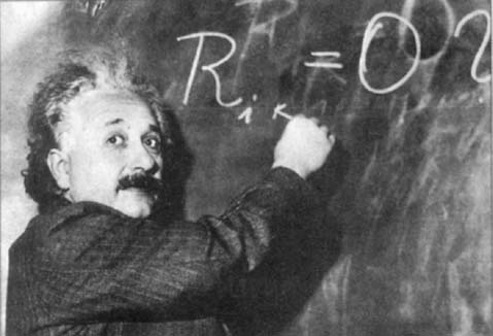Einstein's mind is an action hero in new History Channel tale
11/17/08 12:46 PM

By ED BARK
We live in times when Fox's Are You Smarter Than a 5th Grader? reigns as nighttime's brainiest game show.
History Channel's Einstein (Monday, Nov. 17th at 8 p.m. central) is an upgrade without being too smart for the room.
Little do most of us know that humankind's most famous brainiac -- sorry, Ken Jennings -- had a devil of a time conclusively proving his fabled Theory of Relativity. This two-hour tale, set against a backdrop of World War I and warring scientists, adds up to a compelling look at how Einstein finally won the day and became an international celebrity whose "wild halo of hair" only made his thoughts seem deeper.
It's still hard to grasp exactly what he proved. Basically, though, Sir Isaac Newton's longstanding theory of gravity went out the window once it could be shown that spacetime is "curved."
Einstein's biggest brainstorm needed conclusive physical evidence, though. And that could be obtained only by photographing the stars' alignments around the sun during a total eclipse. Let's just say it took a while, with various hard-driving astronomers competing to prove or disprove what Einstein was talking about.
History Channel for its part deploys an array of contemporary talking heads, the best known being Einstein biographer Walter Isaacson and familiar TV personality Neil DeGrasse Tyson, who also runs the Hayden Planetarium. This expert testimony often is edited into bite-sized bursts that risk dumbing down the story at hand. No one gets to talk for very long.
Tyson -- and we'll have to take his word for it -- says that Einstein's Theory of Relativity had "no wiggle room" in terms of being right or wrong. Or to use a little basketball circular logic, he had to hit nothing but net. Which is what Einstein did after 15 years of perfecting his shot. The end result is a "beautiful and simple and profound" truth, Tyson says. "And all the best theories of the universe are just that."
Tonight's film is mostly about those game-changing 15 years, with Einstein battling his way through ostracism, self-doubt, a world at war and a failed first marriage. He had an odd and self-important way of paying alimony, obtaining a divorce in return for pledging his cash winnings from a Nobel Prize that he just knew would be coming to him.
Einstein remained a virtual nonentity outside of Europe until his Theory of Relativity finally hit paydirt. The U.S. media then couldn't get enough of him. He died in 1955, at age 76, long after also proving that the mind is a beautiful thing to behold.
GRADE: B+
